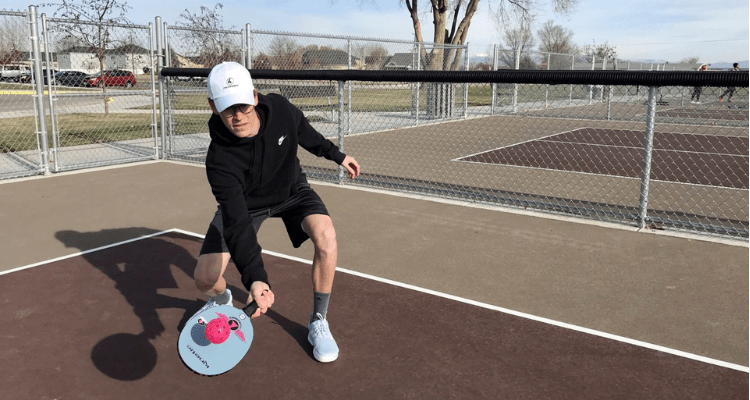Pickleball’s rapid growth in the US has necessitated ways to measure player skill levels. Enter DUPR – the Dynamic Universal Pickleball Rating System. DUPR provides accurate pickleball ratings using advanced statistical modeling on match data. Much like a chess Elo or tennis ATP ranking, DUPR rates players on a scale of 1.00 to 6.00.
The higher the rating, the better the player! This article explains what DUPR is, how the algorithm calculates ratings after each match, the number of rated games needed to stabilize your rating, and how players can track and access their official DUPR rating online.

What is DUPR In Pickleball?
DUPR stands for Dynamic Universal Pickleball Rating. It is a rating system specifically designed for the sport of pickleball to measure a player’s skill level. The DUPR algorithm takes into account various metrics like wins, losses, opponent ratings, score differentials, and more to assign a numeric rating. The ratings range from 1.00 for a beginner to 6.00 for the very best professional players.
Think of DUPR as the pickleball equivalent of rankings used in other sports like an Elo rating in chess or ATP ranking in tennis. It gives players, coaches, and organizers an easy way to determine skill brackets for fair matchmaking. The higher the DUPR, the better the player.
How Pickleball DUPR Works?
The DUPR rating system uses advanced statistical modeling and machine learning to calculate ratings. Each player starts with a provisional rating in the 2.00-2.99 range when they first register on the DUPR website. As the player plays more rated games, their rating starts to converge towards their true skill level.
Here is a simplified explanation of how the DUPR algorithm works:
- The system expects the player with the higher rating to win when up against a lower-rated player. The chance of the lower-rated player winning is the “upset chance”.
- If the higher-rated player wins, they gain a few rating points while the lower-rated player loses roughly the same number of points. The exact points exchanged depend on the chance of an upset.
- If the lower-rated player pulls off an upset win, they gain a lot more points while the higher-rated player loses more points. This enables faster convergence to true ratings.
The actual DUPR calculations involve advanced techniques like Bayesian inference, logistic curve fitting, and dimensionality reduction. But the basic premise is simple – win against players rated higher than you to increase your rating rapidly. Lose to lower-rated players and your rating tanks. By factoring in relative ratings, final scores, and probability, DUPR provides extremely accurate pickleball ratings.

How Many Matches To Get A Pickleball DUPR Rating?
When you first register on a DUPR platform like MyDUPR.com, you will start with a provisional rating while the system collects data about your play. Most players need between 5-15 officially rated matches for their rating to stabilize close to their actual skill level.
Playing more rated games helps the system narrow down ratings faster. If possible, try to play against opponents with established ratings for quicker convergence. The MyDUPR system indicates when your rating has stabilized by granting you an official DUPR status. This means you now have enough match history for an accurate pickleball rating.
Using DUPR For Player Development
Apart from fair matchmaking, the DUPR rating provides other useful insights that can significantly aid player development:
- Quantifiable Way To Track Improvement Seeing your DUPR rise over weeks and months gives you tangible proof that you are improving as a pickleball player. It feels incredibly rewarding to break into new rating buckets like cracking 3.00 or 4.00 barriers.
- Identify Weaknesses A string of upset losses to lower-rated players should set off alarm bells. Analyze these losses to find obvious holes in your game. Are you struggling with dink rallies? Is your backhand cracking under pressure? Does your endurance need work? A downgrade in rating makes weaknesses evident.
- Find Ideal Partners In doubles, your partner’s rating also influences match outcomes. The ideal partner is someone around +/- 0.50 of your rating. Team ratings can be mathematically derived for tournament registration. Partners with good chemistry who also gel skill-wise make formidable teams!
- Game Selection Who you choose to play with and against also affects your rating changes. For example, losing an 11-0 mismatch will tank your rating. But a competitive 11-10 loss or win will have minimal ratings impact. Your wisdom around game selection improves as you get more experience.
Where To Find Your DUPR Rating
Wondering what your DUPR rating is? The easiest way is to register on MyDUPR.com and play a few games under the official DUPR settings. The website and its associated mobile app offer tools to search and register for DUPR-sanctioned tournaments in your locality.

By centralizing rating computation, player profiles, match history, and leaderboards, MyDUPR makes it simple for pickleball players to obtain official DUPR ratings. You can also see how you rank locally or globally against other rated players. Integrations with popular pickleball platforms like Pickleball Brackets mean ratings and rankings carry over seamlessly.
FAQs
What does DUPR stand for?
DUPR stands for Dynamic Universal Pickleball Rating. It is a rating system designed specifically to measure skill levels in pickleball.
What is the rating scale in DUPR?
The DUPR rating scale ranges from 1.00 for beginners to 6.00 for top professional players. Most amateur players fall between 2.00 to 4.00.
How are DUPR ratings calculated?
DUPR ratings are calculated by an advanced algorithm that factors in wins, losses, opponent ratings, score differentials, and upset probabilities for each match.
How many rated DUPR matches to get an accurate rating?
Most players need between 5 to 15 officially rated DUPR matches for their rating to stabilize close to their true skill level.
Where can I check my DUPR rating?
You can register on MyDUPR.com to obtain an official DUPR rating, check the ratings of other players, and search for matches/tournaments.
Conclusion
So there you have it! A simplified breakdown of what DUPR is, how it works, and ways to obtain your rating. Like any skill measurement system, DUPR ratings are not expected to be perfect or stagnant. As you improve or get rusty, your rating will change dynamically to reflect your current playing level.
However, the rating provides a strong baseline indicator of ability around which fair games and tournaments can be organized. Getting a DUPR rating also helps the game by feeding data back into the system to make the algorithm more robust.




